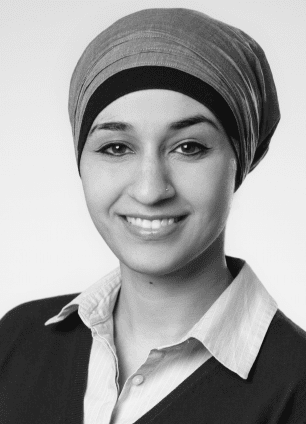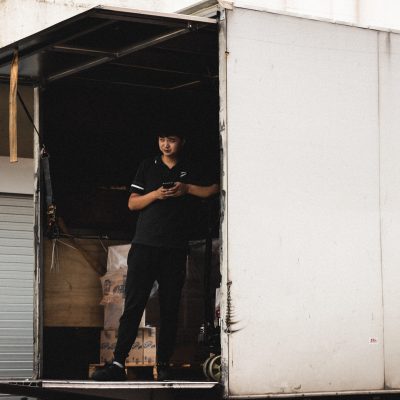Details
Article
Corona is forcing us to stay home these days. For many women in patriarchal systems, this is a common aspect of their everyday life. Anyone celebrating the concept of “domesticity” as an opportunity may better want to think again, shares literary scholar and Humanity in Action Senior Fellow Jasamin Ulfat-Seddiqzai on Deutschlandfunk, a public-broadcasting radio station in Germany. You can listen to the podcast here or read the English summary below, which was originally published in German by Deutschlandfunk.
If you are used to being free, you only know captivity in its most Hollywood-esque form: with doors bolted and barred windows, even though that is rarely how it looks like in reality. Therefore, the current situation is all the more intriguing: locked in at home – and for a good reason – we call what we are currently experiencing “bunker fatigue”, or “corona claustrophobia”. Worried, we read about an increase of domestic violence and depression and fear that this lock-down is doing something to us.
“At first, this lockdown actually feels decelerating, almost relaxing… The true toll however, not just on the economy, but especially on our mental health, will only be apparent later.”
And yet, what we experience is very similar to the lives of women in highly patriarchal societies, be it Saudi Arabia, or Europe roughly one hundred years ago. While we usually talk about these women in theory only, now we have the chance to experience their version of captivity first-hand. And soon we realise that things are not always what they seem.
Like a sleepover – but compulsory
At first, this lockdown actually feels decelerating, almost relaxing. Like a mandatory sleepover. The true toll however, not just on the economy, but especially on our mental health, will only be apparent later. A glance at women in patriarchal societies might give us an idea of what is to come.
As a child you can draw comfort from the fact that one day, you will be an adult and make your own decisions, but many women can never leave paternalism behind.
Many women are not locked up in their houses against their will, or so it seems. “It’s dangerous outside, I can only protect you, when you stay”, is what fathers, brothers, and husbands explain. And it sounds so reasonable that many women – and even the men themselves – believe it. Like in our current situation, captivity feels much better when you live in a nice house, with a loving family. There is a big difference between a cage – and a golden cage.
As a child you can draw comfort from the fact that one day, you will be an adult and make your own decisions, but many women can never leave paternalism behind. And so, women adjust their behaviour, and feel like they do not matter. You realise that you are not part of the “bigger picture”, life manages perfectly without you.
Isolation becomes integral
If this situation lasts too long (or dominates your formative years) you lose your courage. Trying new things becomes anxiety-inducing, you withdraw into yourself and give up a little every day. Some try to liberate themselves, but most just accept what they believe to be their destiny.
What, if it is true? What if the outside world really is too dangerous? What if I cannot survive on my own? Slowly, you welcome isolation, it becomes an integral part of your identity. Every once in a while, you dream about what could have been, but in the end, you lack the imagination. After all, you only know your own four walls.
“What we experience is very similar to the lives of women in highly patriarchal societies, be it Saudi Arabia, or Europe roughly one hundred years ago. While we usually talk about these women in theory only, now we have the chance to experience their version of captivity first-hand.”
If you add a mandatory face veil, this absolute privacy is even carried into the outside world. Behind a veil, life can be comfortable. You signal to your surroundings: don’t speak to me, please! And in the end, the risk of losing your ambitions, and of feeling worthless, rises exponentially.
For centuries men, especially those that were rich and educated, made the world their playground. Meanwhile, women were kept in permanent quarantine limbo, always too sickly and weak to withstand the hardships and tribulations of the outside world.
The Pitfalls of Captivity are often subtle
“What, if it is true? What if the outside world really is too dangerous? What if I cannot survive on my own? Slowly, you welcome isolation, it becomes an integral part of your identity.”
It does not come as a surprise that Jane-Austen-novels are making a comeback these days: they make sense, especially when you are living through a lockdown. Members of Pakistan’s Jane-Austen Society, for example, do not read the novels to gain a glimpse into a British past, but to find their own presence reflected.
Imprisonment is rarely bloody and brutal, like in masculine movies, be they Clint Eastwood’s “Escape from Alcatraz”, or the series “Prison Break”. The pitfalls of captivity are much more subtle and sticky, they pull you down so that you start to believe it is all your fault. That you yourself are to blame for everything you have to endure.
Let me be clear: in our current situation, a lockdown makes absolute sense, it is essential to our survival. We are fighting a virus, not a misogynistic concept of total male superiority. But if you want to celebrate domesticity as a new and alternative way of life, you might want to reconsider.
Jasamin Ulfat is a lecturer at the University of Duisburg-Essen, teaching British literature in a postcolonial context. Her research includes topics such as orientalism and oriental stereotypes, gender and masculinity studies, and Afghanistan as a space of British military intervention and male bonding. Her Ph.D. focuses on the use of race concepts in the Anglo-Afghan conflicts of the 19th century. She occasionally writes journalistic texts about Islam, xenophobia and the headscarf and has been published in German magazines and newspapers. She is a Humanity in Action Senior Fellow (2009 Berlin Fellowship).





